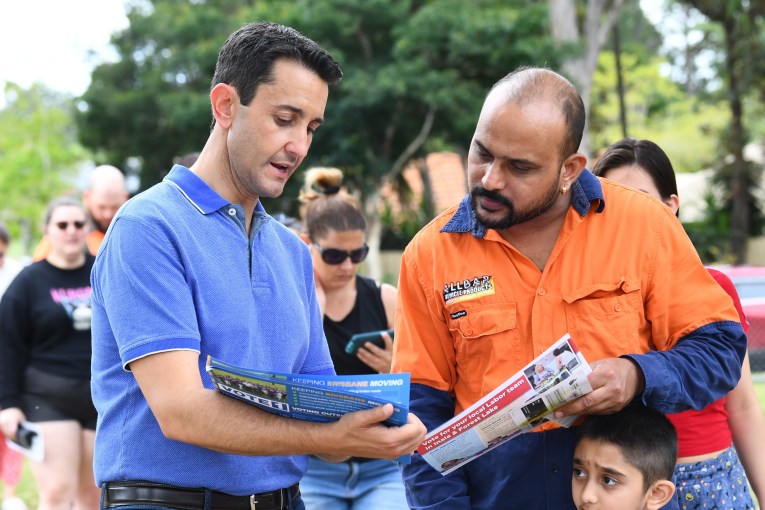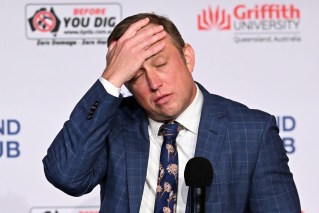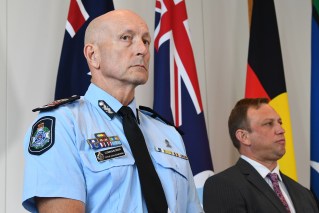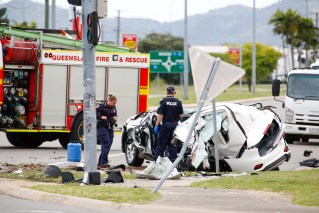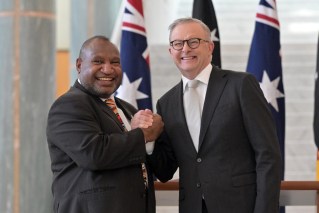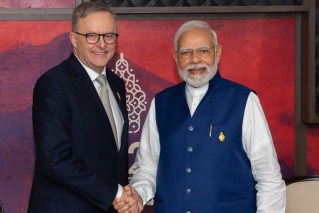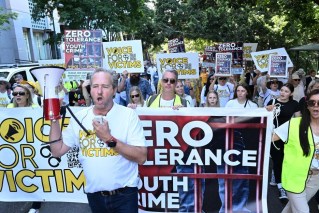Please explain: Premier urges Albo to ‘step up’ promotion of Indigenous voice
Premier Annastacia Palaszczuk has offered some free advice to Prime Minister Anthony Albanese about political campaigns, saying she will talk to him about how information on an Indigenous voice to parliament can be better explained.
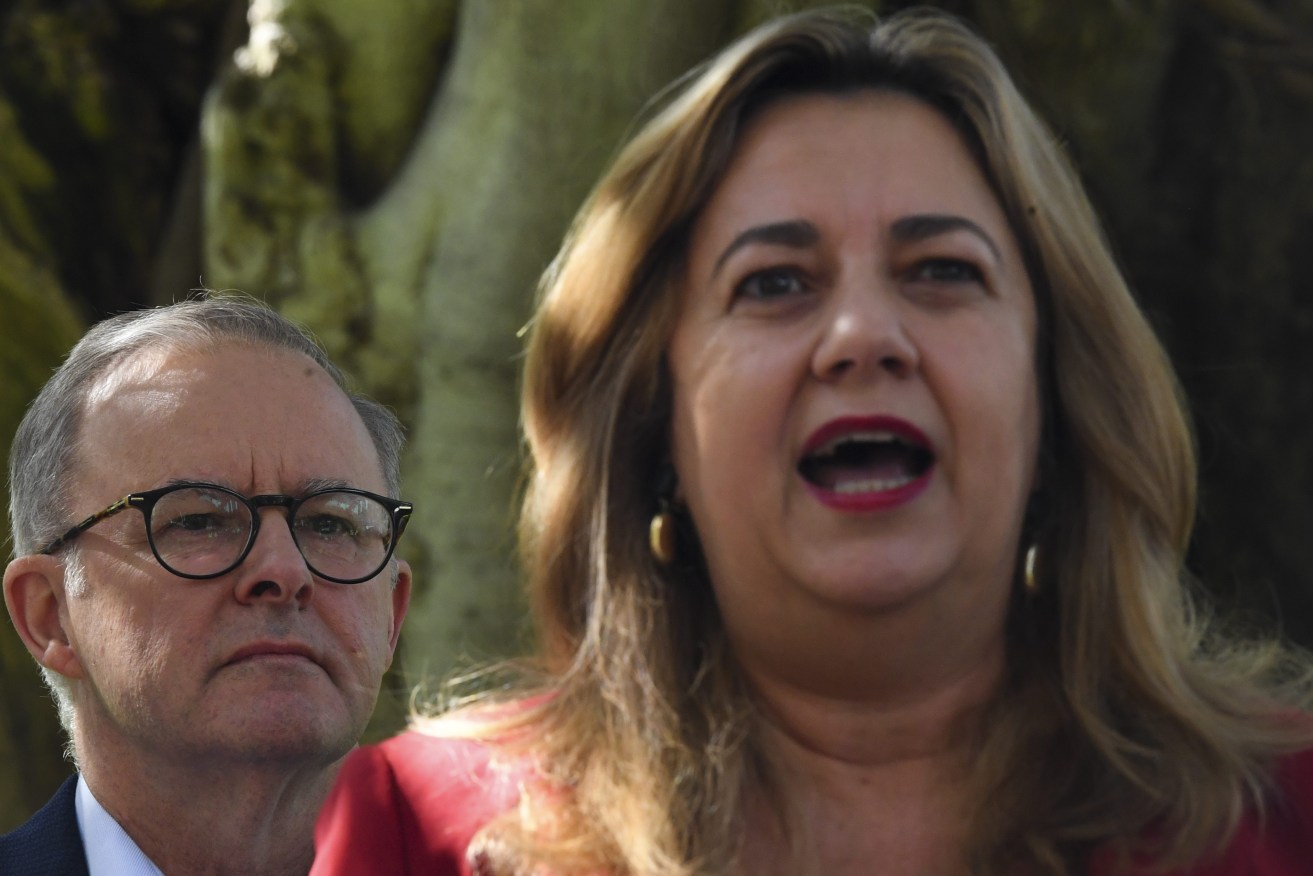
Premier Annastacia Palaszczuk with Prime Minister Anthony Albanese. (AAP Image/Lukas Coch)
Hesitancy about an Indigenous voice to parliament is understandable and the federal government must “step up” its explanation of the proposal, she said.
Her comments came as the Liberal Party opted to formally oppose enshrining an Indigenous voice in the constitution, but said it would back constitutional recognition.
Opposition leader Peter Dutton emerged from a two hour meeting in Canberra to announce the position, saying it would not support a constitutionally enshrined voice to the parliament and executive government.
A Newspoll published in The Australian on Tuesday shows Queensland is the only state to lack majority support for a constitutionally enshrined voice.
About 49 per cent of respondents backed the proposal in the Sunshine State, while 43 per cent were against it.
Palaszczuk supports a constitutional voice, but she says she will speak to Prime Minister Anthony Albanese about providing more clarity to voters.
She says there’s still some uncertainty about the voice proposal, and pointed to her government’s Treaty plans, which three out of four people thought would have some benefit in a recent survey.
“The federal government needs to really step up into that space and explain it, and I’m quite sure that’s going to be coming,” the premier told reporters on Thursday.
“What I would like to see is, once we get that information, First Nations people, business groups, community groups (and) sporting organisations getting out there showing their support across Queensland.
Palaszczuk has previously said the voice will help Australia “move forward as nation”.
Dutton said the Liberal Party did not support “the prime minister’s Canberra voice”, but rather wanted a legislated local and regional voice mechanism.
“We want to make sure that we can get the best possible outcomes for Indigenous Australians,” he told reporters in Canberra.
“We do that through recognising Indigenous Australians in the constitution and by providing for their say, their voice to be heard by government, in a very clear way but at a local level.”
The opposition will propose amendments to the model introduced to parliament by the government at the end of March.
The model was based on recommendations from the referendum working group which provides advice on the voice.
While Liberal backbenchers are free to vote with the government on the legislation, the shadow cabinet is bound by the party position not to support the model.
Moderate Liberals have already expressed disappointment with the position.
Tasmanian MP Bridget Archer said there were few members of the party, including herself, who spoke out against the stance.
“I’m not really surprised. But I am disappointed. I think that this has been some time in the making. I think that nobody is probably going to be really too surprised about the decision that we have made today,” she said.
Dutton said he believed only “three or four” members of his party room would campaign for a ‘yes’ vote.
Albanese earlier said calls from the Liberals to delay a referendum on an Indigenous voice were absurd and his government had sought bipartisan support for the proposal.
“This is a nation-building effort and I call upon everyone to support it,” Albanese told reporters in Canberra.
“This is not controversial and should not be an issue of partisan politics. It’s a modest proposal.
“The idea that you can simply ignore or dismiss the views of the referendum working group in my view contradicts the very concept of a voice which is about listening.”
Before the meeting, former Morrison government minister Ken Wyatt warned his ex-colleagues a decision not to support the voice could come back to bite the Liberal Party.
“Parties that are out of touch will pay the consequence in the future,” he told ABC Radio National on Wednesday.
Wyatt, a member of the referendum working group, said the voice proposal was not new and had been the subject of multiple reports considered by consecutive prime ministers.
“People who argue contrary to that shows they did not give scant attention to even the executive summary of those reports,” he said.
The Newspoll result suggested 54 per cent of all voters support constitutional recognition and and the voice to parliament, with 38 per cent opposed.
The poll signalled the likelihood that a referendum would meet the critical double majority test to succeed if one were held today.
Liberal senator Hollie Hughes said the only poll which counted was the one on the day of the referendum, due to be held between October and December.
But referendum working group member Thomas Mayo said the early polling indicated the sentiment of the Australian people was with the referendum working group and the ‘yes’ campaign.
“(Australians) have walked with us for a long time now … to see these results tells us that we can succeed when the referendum is held,” he told Sky News.
